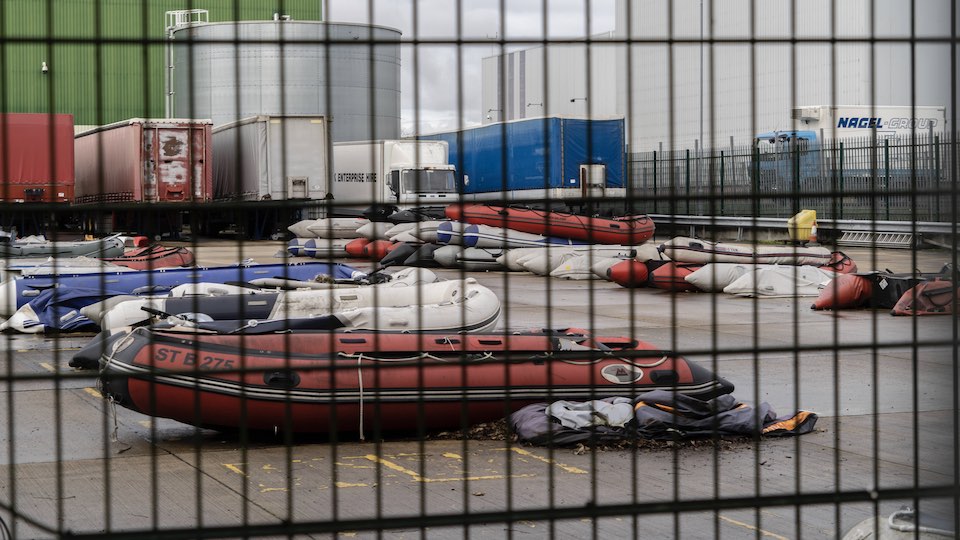Great Britain: Mobile phone surveillance of refugees was unlawful

The British Home Office should not have ordered authorities to confiscate smartphones from asylum seekers and analyse their data. This practice violated the European Convention on Human Rights (ECHR), the High Court of Justice ruled last week in London. The complaint was brought before the court by three people. Their phones had been taken from them when they reached the UK in 2020 after crossing the English Channel.
Between April and November 2020, immigration officials had confiscated phones from asylum seekers in Dover and forced them to reveal their PIN numbers. According to a report in the British newspaper The Guardian, almost 2,000 mobile phones were confiscated and data read out during this period. Some devices were retained for months.
The judges now ruled that the blanket confiscation of the phones violated the right to respect for private life (Article 8 ECHR) of the persons concerned. The court saw a further encroachment on this right because the refugees were threatened with criminal prosecution if they did not hand over their PIN to access the devices.
No legal basis
The Home Office had based the action on section 48 of the UK Immigration Act 2016. However, the court found that this was not a valid legal basis. The provision only allowed for the search of premises and the seizure of objects found in the process. The search of persons could not be derived from it, as it had to be clearly and unambiguously authorised by the law. It was up to parliament to enact legislation to this effect if necessary. However, the executive should not assume powers to itself on the basis of an improper interpretation of existing regulations.
The British organisation Privacy International, which was heard in the case, welcomed the ruling. Lucie Audibert, a lawyer at Privacy International, commented: “It’s quite clear that the Home Office considered that asylum seekers arriving at UK shores did not have the same privacy rights as other people – it unashamedly granted itself unlawful powers to systematically seize and search their phones, even when they weren’t suspected of any crime. This is in line with this government’s (and many others’) efforts to criminalise migration and rob migrants of their basic human rights.”
According to the Guardian, officers had copied personal information such as emails, photos and videos from the phones. As Privacy International reports, these were searched for evidence of criminal activity and also stored in law enforcement databases. The Home Office had argued that officers could find clues to criminal traffickers this way.
Phones withheld for months
At the hearing in January, the lawyer of one of the plaintiffs described that after their phones had been confiscated, they had been given a receipt. On the receipt, a telephone number was given to call in order to get their phones back, but no one could be reached at the number. Many people had to wait for months for the return of their devices.
Smartphones often have a special significance for refugees because they can use them to stay in contact with relatives and to orient themselves during their flight. Privacy International warns that the confiscation of the devices is a considerable burden for those affected. Without them, the refugees would be left without means of communication and would be deprived of souvenir photos, for example. In addition, the authorities would obtain a large amount of personal data that would be irrelevant for their investigations.
The lawyer said at the trial that his client had lost contact with his wife and child because his phone had been taken away from him, and he also no longer had the phone numbers stored in it. “He did not know if they were alive or dead.”
Data protection authority also investigating
The court did not rule on the question of whether the data extraction also violated data protection laws. In the course of the proceedings, the Home Office had turned to the British data protection authority with this question. The latter is now examining the case. Privacy International said that, in their view, data protection had been breached in many respects. They now hope that the data protection authority will decide accordingly.
The court also said that the Ministry of Home Affairs had not initially admitted that the order to seize the phones existed. Whether the ministry has thus violated its duty of candour is to be decided in a further hearing.
Privacy International also criticises the fact that phones continued to be confiscated after 2020 – albeit in smaller numbers. According to the organisation, a planned Policing Bill will allow immigration authorities to search mobile phones if those affected, consent. The organisation argues that due to the inequality of power between the state and migrants, it is questionable whether consent can really be given voluntarily. There must therefore always be a judicial decision. (js)